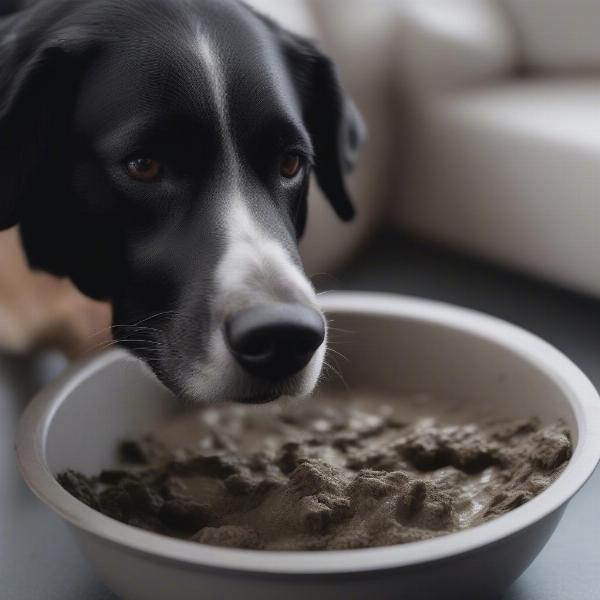Raw dog food diets, like those offered by Mud Bay, have gained popularity among pet owners seeking a more natural approach to canine nutrition. But is a raw diet right for your dog? This guide dives deep into the world of Mud Bay raw dog food, exploring its benefits, risks, and everything you need to know to make an informed decision.
Understanding Mud Bay Raw Dog Food
Mud Bay offers a variety of raw dog food options, typically featuring frozen patties or chunks of meat, organs, and bone. These diets aim to mimic a dog’s ancestral diet. Proponents of raw feeding believe it can lead to shinier coats, healthier skin, improved digestion, and increased energy levels.
However, it’s crucial to understand the potential risks associated with raw feeding. Raw meat can contain harmful bacteria like Salmonella and E. coli, posing a threat to both dogs and humans handling the food. Proper hygiene and safe handling practices are paramount when feeding a raw diet.
Benefits of a Raw Diet
Advocates of raw feeding often report several benefits in their dogs, including:
- Improved Digestion: Raw food is often easier for dogs to digest due to its natural enzymes.
- Enhanced Coat and Skin Health: The high protein and fat content can contribute to a healthier, shinier coat and reduced skin issues.
- Increased Energy Levels: Some owners observe higher energy levels in their dogs after switching to a raw diet.
- Better Dental Health: Chewing on raw bones can help clean teeth and reduce plaque buildup.
It’s important to note that these benefits are often anecdotal and not always supported by scientific research. Consulting with a veterinarian is crucial before switching your dog to a raw diet.
Risks of Feeding Raw Dog Food
While raw diets have potential benefits, they also carry risks:
- Bacterial Contamination: The risk of Salmonella, E. coli, and other harmful bacteria is a significant concern.
- Nutritional Imbalances: Formulating a balanced raw diet requires careful planning and knowledge. Imbalances can lead to health problems.
- Bone Splintering: Cooked bones can splinter and cause internal injuries. While raw bones are less likely to splinter, it’s still important to choose appropriate bone sizes and supervise your dog while they chew.
Transitioning to Mud Bay Raw Dog Food
If you decide to transition your dog to a raw diet after consulting with your veterinarian, do so gradually. Start by mixing a small amount of raw food with their current kibble, gradually increasing the proportion of raw food over several days or weeks. Monitor your dog closely for any digestive upset or other issues.
 A dog eating raw food from a bowl
A dog eating raw food from a bowl
Is Mud Bay Raw Dog Food Right for Your Dog?
The decision to feed a raw diet is a personal one and should be made in consultation with your veterinarian. They can help assess your dog’s individual needs and determine if a raw diet is a suitable option. Factors to consider include your dog’s age, health status, and lifestyle.
FAQ
- Is Mud Bay raw food complete and balanced? Mud Bay offers complete and balanced raw food options, but it’s essential to choose one formulated for your dog’s life stage.
- How do I store Mud Bay raw dog food? Store it in the freezer and thaw only the amount you need for each meal.
- Can puppies eat Mud Bay raw food? Yes, Mud Bay offers formulas specifically designed for puppies.
- What if my dog gets sick after eating raw food? Contact your veterinarian immediately if your dog shows any signs of illness after consuming raw food.
- How much Mud Bay raw food should I feed my dog? Follow the feeding guidelines on the packaging and consult your veterinarian for personalized recommendations.
- Is it safe to handle Mud Bay raw dog food? Yes, but practice proper hygiene. Wash your hands thoroughly after handling the food and clean any surfaces that come into contact with it.
- What are the alternatives to Mud Bay raw dog food? Other raw food brands are available, as well as high-quality kibble and canned food options.
Related Articles on ILM Dog
About ILM Dog
ILM Dog is your trusted resource for expert advice on dog care and nutrition. We offer comprehensive guides on dog breeds, health, training, nutrition, grooming, and much more. Whether you’re a new dog owner or a seasoned pro, we’re here to help you provide the best possible care for your canine companion. For expert advice tailored to your dog’s needs, contact our team of experts via email at [email protected] or phone at +44 20-3965-8624.